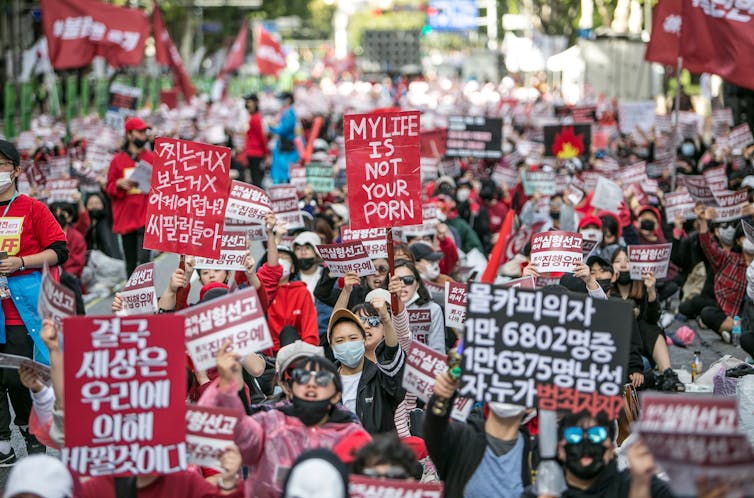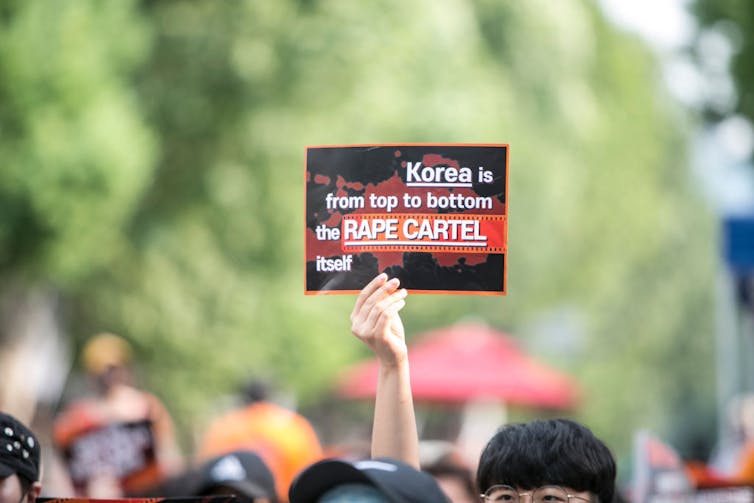Why so many South Korean women are refusing to date, marry or have kids

South Korea finds itself embroiled in an all-out gender war – and it keeps getting worse.
The animosity between Korean men and women has reached a point where some women are outright refusing to date, marry and have kids with men – a phenomenon known as the 4B movement.
As a Korean feminist scholar living in the U.S., I’ve followed this gender war from afar as I conducted research on contemporary Korean gender politics.
However, I also became embroiled in it myself after my research on Korean masculinity was published by CNN.
The article described foreign women who traveled to Korea after becoming enamored of the idea of dating Korean men from watching Korean television dramas. I pointed out that since the tourists’ fantasies were based on fictional characters, some of them ended up disappointed with the Korean men they dated in real life.
The article was about racial politics and the masculine ideals. But some Korean readers thought that I was simply criticizing Korean men for not being romantic and handsome enough. One enraged Korean man commented that I was an “ugly feminist.”
But this was tame in comparison to what women living in South Korea have endured in recent years.
Extreme misogyny and a feminist backlash
Over the past couple of decades, there have been flash points in this gender war.
In 2010, Ilbe, a right-wing website that traffics in misogyny, started attracting users who peppered the forums with vulgar posts about women.
Then in 2015, an online extremist feminist group named Megalia arose. Its goal was to fight back by demeaning Korean men in ways that mirrored the rhetoric on sites like Ilbe.
A year later, a man who had professed his hatred of women murdered a random woman in a public bathroom near a Seoul subway station. He was eventually sentenced to decades in prison, but the lines were quickly drawn. On one side were feminists, who saw misogyny as the underlying motive. On the other side were men who claimed that it was merely the isolated actions of a mentally ill man. The two groups violently clashed during competing protests at the site of the murder.
A backdrop of digital sex crimes
However, none of these events have elicited as much public controversy as the steep rise in digital sex crimes. These are newer forms of sexual violence facilitated by technology: revenge porn; upskirting, which refers to surreptitiously snapping photos under women’s skirts in public; and the use of hidden cameras to film women having sex or undressing.
In 2018, there were 2,289 reported cases of digital sex crimes; in 2021, the number snowballed to 10,353.
In 2019, there were two major incidents that involved digital sex crimes.
In one, a number of male K-pop stars were indicted for filming and circulating videos of women in group chatrooms without their consent.
A few months later, Koreans were shocked to learn about what became known as the “Nth Room Incident,” during which hundreds of perpetrators – mostly men – committed digital sex crimes on dozens of women and minors.
They tended to target poorer women – sex workers, or women who wanted to make a few bucks by sharing anonymous nude photos of themselves. The perpetrators either hacked into their social media accounts or approached these women and offered them money, but asked for their personal information so they could transmit the funds. Once they obtained this information, they blackmailed the women by threatening to reveal their sex work and their nudes to their friends and family.
Since sex work and posting nude images of yourself online are illegal in Korea, the women, fearing arrest or being ostracized by friends and family, complied with the perpetrators’ demands to send even more compromising images of themselves. The men would then swap these images in chatrooms.

And yet a 2019 survey conducted by the Korean government found that large swaths of the population blamed women for these sex crimes: 52% said that they believed sexual violence occurs because women wear revealing clothes, while 37% thought if women experienced sexual assault while drunk, they are partly to blame for their victimization.
In other words, a significant percentage of the Korean population believes that female sexuality is the problem – not the sexual violence.
Government policy lays the groundwork
Digital sex crimes are too widespread to lay the blame at the feet of a handful of bad actors.
To me, part of the problem stems from the long history of “gendered citizenship.”
Korean feminist scholar Seungsook Moon has written about the ways in which the government created one track for men and another for women as the country sought to modernize in the second half of the 20th century:
“Men were mobilized for mandatory military service and then, as conscripts, utilized as workers and researchers in the industrializing economy. Women were consigned to lesser factory jobs, and their roles as members of the modern nation were defined largely in terms of biological reproduction and household management.”
Although these policies are no longer officially carried out, the underlying attitudes about gender roles remain embedded in Korean life and culture. Women who veer from being mothers and housewives expose themselves to public and private backlash.
The government has created gender quotas in certain industries to try to unravel this system of gendered citizenship.
For instance, some government jobs have minimum gender quotas for new hires, and the government encourages the private sector to implement similar policies. In historically male-dominant industries, such as construction, there are quotas for female hires, while in historically female-dominant industries, such as education, there are male quotas.
In some ways, this has only made things worse. Each gender feels as if the other is receiving special treatment due to these affirmative action policies. Resentment festers.
‘The generation that has given up’
Today, the sense of competition between young men and women is exacerbated by the soaring cost of living and rampant unemployment.
Called the “N-Po Generation,” which roughly translates as “the generation that has given up,” many young South Koreans don’t think they can achieve certain milestones that previous generations took for granted: marriage, having kids, finding a job, owning a home and even friendships.

Although all genders find themselves discouraged, the act of “giving up” has caused more problems for women. Men see women who forgo marriage and having kids as selfish. And when they then try to compete against men for jobs, some men become incensed.
Many of the men who have become radicalized commit digital sex crimes to take revenge on women who, in their view, have abandoned their duties.
Ultimately, the competitive dynamic created by the Korean government’s embrace of gendered citizenship has stoked the virulent gender war between Korean men and women, with digital sex crimes used as ammunition.
The 4B movement, whereby Korean women forego heterosexual dating, marriage, and childbirth, represents a radical escalation of the gender war by seeking to create an online and offline world devoid of men. Rather than engaging in altercations, these women are refusing to interact with men, period.
Digital sex crimes are a global problem
To be sure, digital sex crimes are not unique to Korea.
When I teach my college class on digital sex crimes in the U.S., I’m surprised by how many of my students admit that they’ve been victims of digital sex crimes, or knew of it happening at their high schools. And at the National Women’s Studies Association’s annual conference in 2022, I watched feminist activists and scholars from all over the world present their findings about digital sex crimes back home.
Since each country has its own cultural context for the rise in digital sex crimes, there isn’t a single solution to solve the problems. But in South Korea, continuing to unravel the system of gendered citizenship could be part of the solution.
Min Joo Lee, Postdoctoral Fellow, Indiana University
This article is republished from The Conversation under a Creative Commons license.
